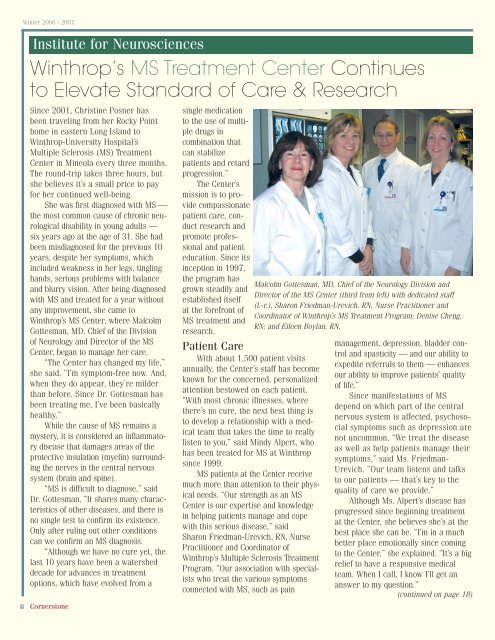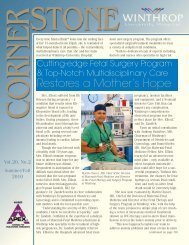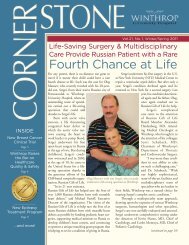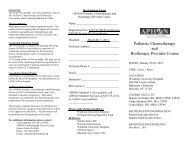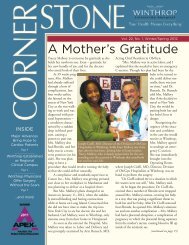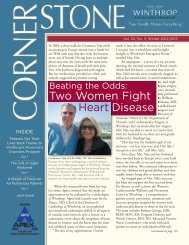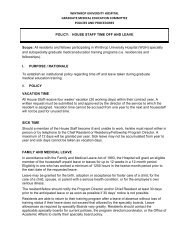13134 Cornerstone 2.07 New - Winthrop University Hospital
13134 Cornerstone 2.07 New - Winthrop University Hospital
13134 Cornerstone 2.07 New - Winthrop University Hospital
Create successful ePaper yourself
Turn your PDF publications into a flip-book with our unique Google optimized e-Paper software.
Winter 2006 • 2007<br />
Institute for Neurosciences<br />
<strong>Winthrop</strong>’s MS Treatment Center Continues<br />
to Elevate Standard of Care & Research<br />
Since 2001, Christine Posner has<br />
been traveling from her Rocky Point<br />
home in eastern Long Island to<br />
<strong>Winthrop</strong>-<strong>University</strong> <strong>Hospital</strong>’s<br />
Multiple Sclerosis (MS) Treatment<br />
Center in Mineola every three months.<br />
The round-trip takes three hours, but<br />
she believes it’s a small price to pay<br />
for her continued well-being.<br />
She was first diagnosed with MS —<br />
the most common cause of chronic neurological<br />
disability in young adults —<br />
six years ago at the age of 31. She had<br />
been misdiagnosed for the previous 10<br />
years, despite her symptoms, which<br />
included weakness in her legs, tingling<br />
hands, serious problems with balance<br />
and blurry vision. After being diagnosed<br />
with MS and treated for a year without<br />
any improvement, she came to<br />
<strong>Winthrop</strong>’s MS Center, where Malcolm<br />
Gottesman, MD, Chief of the Division<br />
of Neurology and Director of the MS<br />
Center, began to manage her care.<br />
“The Center has changed my life,”<br />
she said. “I’m symptom-free now. And,<br />
when they do appear, they’re milder<br />
than before. Since Dr. Gottesman has<br />
been treating me, I’ve been basically<br />
healthy.”<br />
While the cause of MS remains a<br />
mystery, it is considered an inflammatory<br />
disease that damages areas of the<br />
protective insulation (myelin) surrounding<br />
the nerves in the central nervous<br />
system (brain and spine).<br />
“MS is difficult to diagnose,” said<br />
Dr. Gottesman. “It shares many characteristics<br />
of other diseases, and there is<br />
no single test to confirm its existence.<br />
Only after ruling out other conditions<br />
can we confirm an MS diagnosis.<br />
“Although we have no cure yet, the<br />
last 10 years have been a watershed<br />
decade for advances in treatment<br />
options, which have evolved from a<br />
8 <strong>Cornerstone</strong><br />
single medication<br />
to the use of multiple<br />
drugs in<br />
combination that<br />
can stabilize<br />
patients and retard<br />
progression.”<br />
The Center’s<br />
mission is to provide<br />
compassionate<br />
patient care, conduct<br />
research and<br />
promote professional<br />
and patient<br />
education. Since its<br />
inception in 1997,<br />
the program has<br />
grown steadily and<br />
established itself<br />
at the forefront of<br />
MS treatment and<br />
research.<br />
Patient Care<br />
With about 1,500 patient visits<br />
annually, the Center’s staff has become<br />
known for the concerned, personalized<br />
attention bestowed on each patient.<br />
“With most chronic illnesses, where<br />
there’s no cure, the next best thing is<br />
to develop a relationship with a medical<br />
team that takes the time to really<br />
listen to you,” said Mindy Alpert, who<br />
has been treated for MS at <strong>Winthrop</strong><br />
since 1999.<br />
MS patients at the Center receive<br />
much more than attention to their physical<br />
needs. “Our strength as an MS<br />
Center is our expertise and knowledge<br />
in helping patients manage and cope<br />
with this serious disease,” said<br />
Sharon Friedman-Urevich, RN, Nurse<br />
Practitioner and Coordinator of<br />
<strong>Winthrop</strong>’s Multiple Sclerosis Treatment<br />
Program. “Our association with specialists<br />
who treat the various symptoms<br />
connected with MS, such as pain<br />
Malcolm Gottesman, MD, Chief of the Neurology Division and<br />
Director of the MS Center (third from left) with dedicated staff<br />
(l.-r.), Sharon Friedman-Urevich, RN, Nurse Practitioner and<br />
Coordinator of <strong>Winthrop</strong>’s MS Treatment Program; Denise Cheng,<br />
RN; and Eileen Boylan, RN.<br />
management, depression, bladder control<br />
and spasticity — and our ability to<br />
expedite referrals to them — enhances<br />
our ability to improve patients’ quality<br />
of life.”<br />
Since manifestations of MS<br />
depend on which part of the central<br />
nervous system is affected, psychosocial<br />
symptoms such as depression are<br />
not uncommon. “We treat the disease<br />
as well as help patients manage their<br />
symptoms,” said Ms. Friedman-<br />
Urevich. “Our team listens and talks<br />
to our patients — that’s key to the<br />
quality of care we provide.”<br />
Although Ms. Alpert’s disease has<br />
progressed since beginning treatment<br />
at the Center, she believes she’s at the<br />
best place she can be. “I’m in a much<br />
better place emotionally since coming<br />
to the Center,” she explained. “It’s a big<br />
relief to have a responsive medical<br />
team. When I call, I know I’ll get an<br />
answer to my question.”<br />
(continued on page 18)


